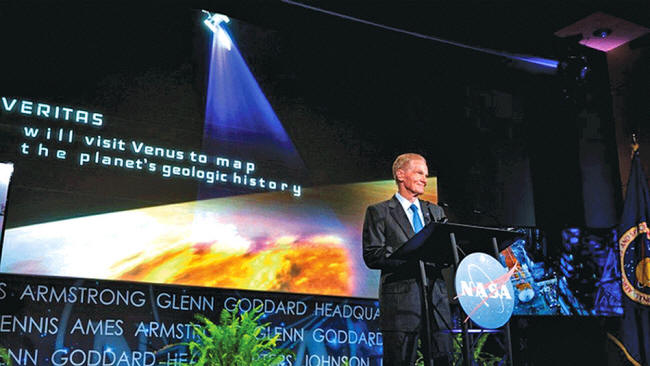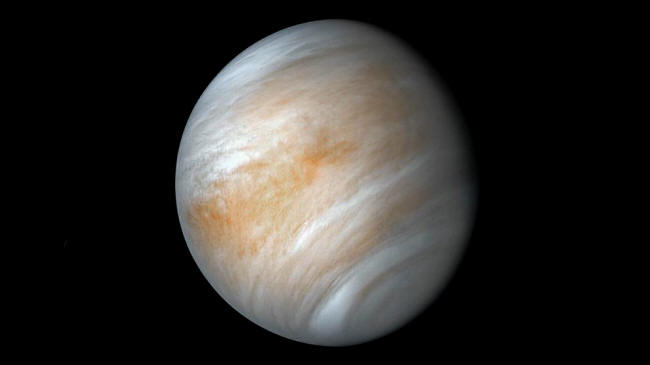|
by Elizabeth Howell it's Venus' time to shine...
The two missions, called DAVINCI+ and VERITAS were selected from NASA's shortlist of four spacecraft for the next round of Discovery missions.
The other two contenders would have visited Jupiter's volcanic moon Io and Neptune's largest moon Triton.
DAVINCI+ (short for Deep Atmosphere Venus Investigation of Noble Gases, Chemistry and Imaging) will plunge through the thick Venus atmosphere to learn more about it changes over time.
Meanwhile, VERITAS (Venus Emissivity, Radio Science, InSAR, Topography and Spectroscopy) mission will use radar to map Venus' surface in detail from orbit.
Venus is swathed in a thick atmosphere that is difficult for scientists to peer through. (Image credit: NASA/JPL-Caltech)
Discovery missions are capped at $500 million, excluding costs for the launch vehicle and mission operations.
Both new Venus missions will launch between 2028 and 2030 and will carry technology demonstrations as well as the main science components, NASA said in a press release.
VERITAS will host the Deep Space Atomic Clock-2, a successor to similar technology that launched to Earth orbit in June 2019.
There was little else new in the State of NASA speech, as it included allusions to climate change science, the Artemis moon-landing program and other recent announcements by the Biden administration.
Nelson was sworn in as administrator May 3 and the career space politician opened his speech with anecdotes from his six-day flight on the space shuttle Columbia in 1986.
He used those memories of the fragility of the Earth to reintroduce the Earth System Observatory system the agency said it would design last week to combat global warming.
The new observatory system includes five planned satellites, the first of which would launch in 2023, Nelson said.
He hinted there would be more to come in terms of climate science announcements.
The new administrator also paid tribute to the Perseverance rover mission, which landed on Mars on Feb. 18 and helped to launch the Ingenuity drone for the first-ever flights on Mars.
Other NASA activities Nelson highlighted included the launch of the James Webb Space Telescope "in just a few months" (NASA and its partner on the mission, the European Space Agency, had announced on Tuesday, June 1, that the mission may delay a few weeks to November) the beginning of the commercial crew program in 2020, and ongoing development for the Artemis moon-landing program.
Nelson said nothing about the moon-landing deadline of 2024, originally proposed by the administration of President Donald Trump.
During a news conference held on Friday, May 28, NASA Chief Financial Officer Steve Shinn acknowledged the timeline could be pushed,
Instead, Nelson focused on the program's goal to put the first woman and (a new announcement from April) the first person of color on the moon.
The address also included a cameo prerecorded video from "Star Trek - The Original Series" captain William Shatner, best known as Captain James T. Kirk to Trekkies, mainly pondering "why we exist" and NASA's aspirations to seek out habitable environments in the universe.
While this is Nelson's first major address as administrator, other priorities came to the fore during his first Congressional hearing two weeks ago as he pledged action about Artemis and recent Chinese activities on the moon and Mars.
China's push for 'space superiority' also came up during a Senate hearing this month considering the nomination of former astronaut Pam Melroy as NASA deputy administrator.
Nelson's speech today left out mention of the troubled Artemis human landing system (HLS) development.
Contract competitors Blue Origin and Dynetics have protested the award of that contract to SpaceX in April; during Nelson's confirmation hearing, senators pushed him about the importance of having multiple different systems to ensure competitive results.
The U.S. Government Accountability Office has until Aug. 4 to decide whether NASA should award a second contract to build a second, redundant HLS.
Nelson also did not talk about commercial development of low Earth orbit, which received $101.1 million in Biden's budget request for fiscal year 2022, which begins in October.
The value is up nearly 500% from the previous year.
Involvement in the International Space Station is still a priority of the new administration; Biden's $1.3 million budget request is roughly equivalent to 2021's allocation.
2 New Missions to Venus
|



